
While the media has covered the Terri Schiavo case extensively over the past two weeks little coverage has been given to the history of two of the key players: Schiavo’s father and Rep. Tom DeLay. Both men faced a similar dilemma years ago and both supported their parents right to die. We talk to reporters who broke these stories. [includes rush transcript]
According to a USA Today/CNN/Gallup Poll released last week, President Bush’s approval rating has fallen to 45% percent, the lowest point of his presidency. The poll found the largest drop for Bush came among men, self-described conservatives and churchgoers. Independent political analysts said the drop may reflect opposition to the White House and Congress intervening in the Terri Schiavo matter. A CBS poll released over the weekend showed that 82% percent of Americans thought Congress should have stayed out of the Schiavo case and 75% percent said government should keep out of end-of-life issues. One of the most outspoken voices in the Congress over the past 2 weeks on this issue is House Majority Leader Tom DeLay.
- Rep. Tom Delay (R-TX), speaking on March 18
House Majority Leader Tom DeLay, who has been one of the most outspoken opponents of removing Terri Schiavo’s feeding tube. But 17 years ago, DeLay and his family had to make a simliar decision over his own comatose father and they elected not to keep him alive by artificial means. We are joined on the phone by Walter Roche- one of two L.A Times reporters who broke this story. And from the studio in Washington DC, we are joined by two guests–Judd Legum–director of research at the Center for American Progress and Suzanne Goldenberg, the US correspondent for the British Guardian newspaper. Judd has also been conducting research into Tom Delay’s involvement in the Schiavo case. And in her own reporting on the Schiavo case, Suzanne Goldenberg found that Terri’s father decided to turn off the life support system for his own 79 year old mother who was ill with pneumonia for a week.
- Walter Roche, reporter, Los Angeles Times. He co-authored the article DeLay’s Own Tragic Crossroads
- Suzanne Goldenberg, U.S correspondent for The Guardian
- Judd Legum, Director of Research, Center for American Progress
Transcript
AMY GOODMAN: One of the most outspoken voices in the Congress over the past two weeks on this issue is House Majority Leader Tom DeLay.
TOM DELAY: To friends, family and millions of people praying around the world this Palm Sunday weekend, don’t be afraid. Terri Schiavo will not be forsaken.
AMY GOODMAN: House Majority Leader Tom Delay, who’s been one of the most outspoken opponents of removing Terri Schiavo’s feeding tube. But 17 years ago, Delay and his family had to make a similar decision over his own comatose father. They elected not to keep him alive by artificial means. We’re joined on the phone right now by Walter Roche, one of the two Los Angeles Times reporters who broke the story. Welcome to Democracy Now!
WALTER ROCHE: Thank you.
AMY GOODMAN: It’s great to have you with us. Tell us what you learned. Tell us exactly what happened 17 years ago?
WALTER ROCHE: What happened was the Congressman’s father, he had just been elected to his third term then, he and his brother had — they were tinkerers. They had built a tram railroad car to take them down from his lake house in Texas down to the lake below, which was like a 200 foot drop, and they were trying it out for the first time. One of the brothers — the father had just gone and got a new part for the rail car, part of the braking mechanism. When the two brothers and their wives got in the car, it suddenly started flying down the tracks out of control. He apparently continually tried to apply the brakes, and it didn’t work. And they went slamming into — off the track into some rocks, and he was — the father was thrown into a tree, and suffered severe injuries to the right side of his body, his head and his chest. He had had broken ribs. He had internal brain damage.
He was kept alive for about 27 days. He was on a respirator, and the doctors had told the family, according to the people that Sam Verhovek and I talked to, that if he did live, he would most likely be at best in a vegetative state. And the family decided that when his kidneys started to fail, and the question would have been to give him dialysis to keep him going, the family decided not to do that. And they put a do not resuscitate order into his medical record, and he died 27 days after the accident at the Brook Army Medical Center in Texas. Subsequent to that, the family filed a lawsuit against the company that — one of the companies that manufactured the part of the brake that they bought and the other company that had sold it to them, and that’s where it’s in the records of that lawsuit that most of the details of the accident and — you know, the story of what happened are there on file down in Texas.
AMY GOODMAN: Can you talk about the family members that you contacted and what they say about where Tom DeLay fit into this?
WALTER ROCHE: What they said was that — and we talked with — my colleague talked with Tom’s mother, and I talked with Tom’s aunt, both are whom were in the tram car. They said that Tom was not directly involved in all of the decisions — you know, in everything, because he was apparently coming back and forth to Washington, but that when the decision was made, he went along with it, and he made — you know the — our understanding was that he raised no objection to that decision at that time.
AMY GOODMAN: I thought it was interesting in the interviews that they saw the irony.
WALTER ROCHE: Yes. I think there is some irony there.
AMY GOODMAN: Yet Tom Delay is the person who really spearheaded this unprecedented Congressional move, I mean, not just in this Congress, but in the history of the United States, to intervene in this particular case. Can you talk about his role, Walter Roche?
WALTER ROCHE: Well, I did not write about the legislation, but I’m familiar with it, and it is rather extraordinary, I think, for Congress to pass an act specifically targeted to a specific individual and a specific case, and if you read the legislation carefully, what it did and what it — people thought it promised were not exactly the same thing. It required that the courts grant a review at the federal level, but it did not — did not guarantee that the feeding tube would be reinserted, as obviously, we have learned.
AMY GOODMAN: Talking to Walter Roche of The Los Angeles Times whose piece showed that 17 years ago, Tom DeLay and his own family went through this own painful — I think the operative word, though, is very “personal” — decision not to keep Tom DeLay’s father alive by external means when he had a freak accident in his backyard. We’re also joined in our Washington studio by two guests, Judd Legum is Director of Research at Center for American Progress, and Suzanne Goldenberg is the U.S. correspondent for the British Guardian newspaper. Can you talk, Judd, about Tom DeLay’s involvement in the whole Schiavo case, and what The Los Angeles Times report means for that?
JUDD LEGUM: Well, I think Tom DeLay, without a doubt, is one of the two or three most outspoken people in Congress on this issue, and he said the very kind of thing that he himself participated in with his family 17 years ago was an act of barbarism and murder. He was that explicit about it, so I think it draws serious questions about his motivations in this case.
AMY GOODMAN: You were also joined by Suzanne Goldenberg of the Guardian. You wrote a very interesting piece, but it was more than a year ago, that found that Terri’s father himself, Mr. Schindler, decided to turn off the life support for his own mother, who was ill with pneumonia for a week. Can you talk about that?
SUZANNE GOLDENBERG: Yes, he did. I spent about a day — the large part of the day with the Schindler’s at their camper van, which is across the street from the hospice. Over time he told the story of how his mother had been ill with pneumonia, and her kidneys were giving out. He had a conversation with the doctors about what decisions needed to be made, and he asked — I have gone back to my notebook and looked at the quotes. He asked if I put her on a ventilator, does she have a chance of surviving, of coming out of this thing? And apparently, after discussing with the doctors, he decided his mother did not have a chance of a normal life, and so he decided to cut off the ventilator. It’s not in the story, but he also told me that he wanted the decisions about his last moments, you know, if he were to suffer a catastrophic accident, that he would want those decisions to be made by his wife, and the other two members of the Schindler family, Suzanne and Bobby, were also ambivalent about what they would want to happen if they were stricken in a way similar to Terri. Both suggested to me that they did not want to be kept alive, if they were, you know, in a persistent vegetative state or to be kept alive by artificial means.
AMY GOODMAN: Now, Suzanne Goldenberg, when did you conduct these interviews?
SUZANNE GOLDENBERG: This was done in early November 2003. It was — that was the last crisis — point of crisis in the Terri Schiavo affair, when Governor Jeb Bush of Florida had intervened to pass a special law to reinsert the feeding tube. So, at that point, there weren’t all of the reporters around in that area, and so I was able to sort of spend time with the family and discuss these issues with them.
AMY GOODMAN: So, how does this jive with their position now?
SUZANNE GOLDENBERG: It’s at odds with the position now, but you can’t — I’m not sure what conclusions you can draw to motivation. I mean, it could be that Mr. Schindler feels so much remorse about the decision he made then, he’s decided to keep his — to try and keep his daughter alive at all costs. I mean, Michael Schiavo is basing — has said that he based his decision now on what to do about his wife on his own experience in dealing with his mother’s death, I mean, in 1997, when they did prolong her life. I think what you can say is that these — for these people, these were deeply personal decisions that were taken in private, and that that is not the case now, of course.
AMY GOODMAN: We are talking about Suzanne Goldenberg, U.S. correspondent for The Guardian. We are also speaking with Judd Legum, the Director of Research at the Center for American Progress, Walter Roche is with The Los Angeles Times. We’ll be back with Judd and Suzanne in a minute.
[break]
AMY GOODMAN: We are talking right now about the politics of the Terri Schiavo case, Tom DeLay, and the exposé in The Los Angeles Times that, in fact, in Tom DeLay’s own family, 17 years ago, his family and Tom DeLay himself made the decision to not use extraordinary means to keep his father alive. He had suffered a freak accident. We’re also joined in Washington by Judd Legum, Director of Research at the Center for American Progress, and Suzanne Goldenberg, the U.S. correspondent for the The Guardian. Suzanne did a piece over a year ago saying that Terri’s father had, in fact, made the same decision with his own mother, not to keep her alive after a bout with pneumonia, deciding not to keep her alive through artificial means. But I wanted to start with Judd Legum on the history of Tom DeLay’s role in this. Tom DeLay, who’s been suffering from his own problems with ethical breaches.
JUDD LEGUM: Well, Tom DeLay came pretty late to the Terri Schiavo case. We did a pretty thorough search looking back at newspaper articles, his website, the congressional record, and the first time Tom DeLay mentioned Terri Schiavo was on March 11 of this year; and, as we’ve been discussing, this is a case that’s been going on for several years. So, I think that raises a very serious question of Tom DeLay’s motivations in this, and was it motivated by a concern for what the Schindlers are going through, what Terri Schiavo’s going through, which is obviously a very tragic situation, or was it a more calculated maneuver to distract attention from the various ethical problems that he’s been having over the past months and years?
AMY GOODMAN: There’s also another irony in the case of Tom DeLay’s own family in making this decision to allow his father to die, and that has to do with the issue of bringing a lawsuit against the company involved with this freak accident.
JUDD LEGUM: That’s right. Right after this accident occurred, and they made the decision to remove life support, Tom DeLay and his family sued the manufacturer of a bearing ball company that was actually involved in the manufacturing of this lift that caused the accident of Tom DeLay’s father, and they sued them on a product liability lawsuit. They settled it for a fairly substantial sum, around $250,000, and Tom DeLay, although he says he gave the money to his mother, personally profited from this. And what’s really interested about that is, just three years later, Tom DeLay introduced a bill into Congress which would have trumped the very kind of state laws that his family sued this company under, and made this substantial recovery under.
AMY GOODMAN: The New York Times reported on Sunday (and this is going to a different issue) that the Pentagon is considering substantial changes to the military tribunals that the Bush administration established to prosecute who they call 'foreign terror suspects' at Guantanamo Bay. The move comes after intense criticism from human rights groups and military attorneys. You have written about this as well on the American Progress website.
JUDD LEGUM: That’s right. And the situation that’s going on there is, not only has it been subject to criticism (which is certainly one thing that’s concerning), but it’s also been ruled — these tribunals have been ruled unconstitutional by a federal judge; and so there is (and this is a positive development) movement within the Department of Defense to reform these procedures and to bring them more into line with the standard court-martial proceedings and there’s really the American judicial system and the protections that we traditionally afford defendants. But Vice President Cheney is leading a small group of people who are very much opposed to any changes unless they’re absolutely mandated to do so by the courts.

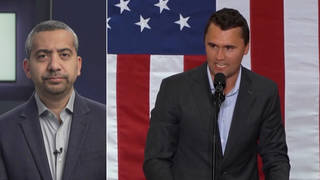
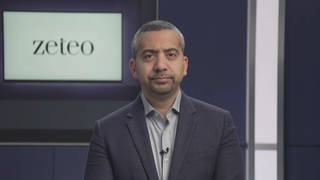
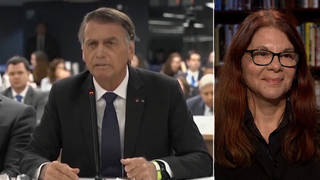
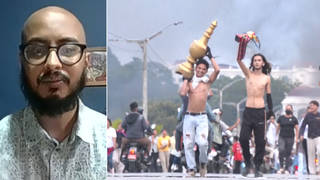





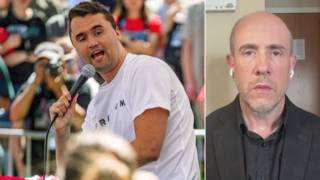
Media Options